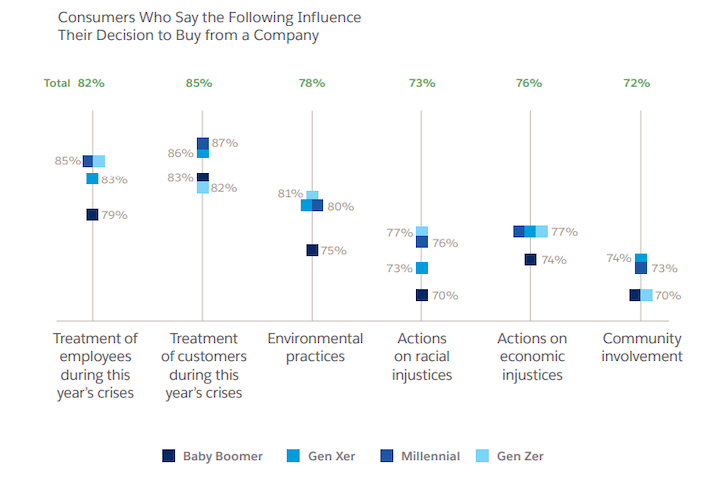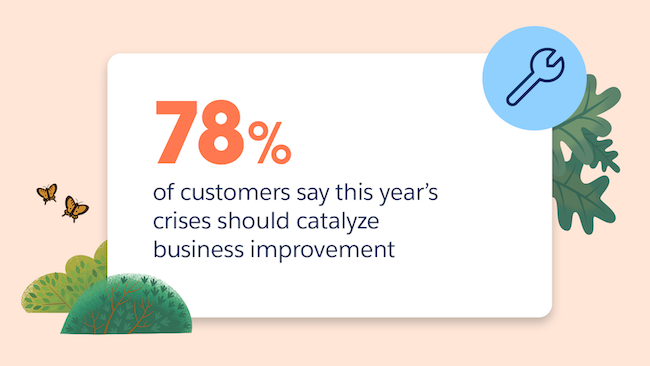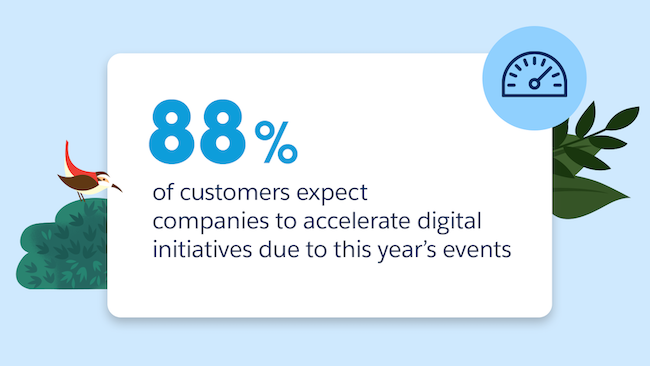Customer demands have certainly evolved this year, and we’ve faced unprecedented global change. Businesses of all sizes, in all industries, have had to rapidly react to ongoing economic, health, leadership, social justice, and climate crises.
Just as the world around us has altered, so have customer demands. Digital-first convenience is no longer an added bonus. It’s an essential part of meeting customer demand.
Digital transformation is just the start of how we should respond to customer demands. We need to be building trust, more than ever, and looking after employees, more than ever. We must also try to have a positive effect on society as a whole, wherever and whenever we can.
We’ve put together the Salesforce State of the Connected Customer (4th edition) to support you in doing just that. With valuable insights from over 15,000 customers (both B2B and B2C), we hope you can benefit from the report as you navigate the new normal.
Are you demonstrating the right values to meet customer demands?
The spotlight is firmly on the way businesses deal with certain issues, thanks to the events of 2020 so far. Consumers are without a doubt holding organisations to a much higher standard. Things like their treatment of employees, involvement in climate change, stance on racial injustice, and more.
In fact, 86% of customers say they think the role companies play in society is shifting.
Customers understand the influence they can have on the way businesses behave. And they’re certainly happy to use that influence to build the type of world they want. The events of this year have highlighted to customers just how important ethics are. We can all see the change as customers hold businesses to account.
Ethical digital-first convenience
Whether your business is B2B or B2C, ethics should be a key consideration in your overall strategy. As well as recognising their power to influence change, customers are actually doing something about it. In fact, 55% of customers think they’re able to influence change in the businesses they buy from. A company's ethics are also critical to business buyers as well.
“75% of business buyers say vendors’ ethics increasingly factor into their purchasing decisions.”
Knowing that consumers want more from you means you can work even harder to meet customer demands and demonstrate that your ethics and values align with theirs.
Here’s what consumers are saying has changed compared to a year ago:
71% are paying more attention to a business’s values.
61% have stopped giving their business to companies that don’t reflect their own ethics.
59% have started using companies that do mirror their own values.
The accountability bar and your customers: which generation holds it higher?
Perhaps unsurprisingly, our results show a generational difference in how responsible customers hold companies responsible for certain ethical actions. Younger generations definitely hold the bar higher, as you can see from the numbers.
For example, 47% of Gen Z and 46% of Millennials say they hold a business completely responsible for using tech ethically, even if it reduces profits, compared to just 35% of Baby Boomers. And 45% of Gen Z and 41% of Millennials say they hold a business completely responsible for advocating for human rights compared to only 29% of Baby Boomers.
Even if your current customer base is of an older generation, it’s important not to get complacent, thinking that your customers aren’t pushing for change in the same way and with the same urgency. Because, of course, not only do individuals often change their views as they learn more (and with children and grandchildren to influence them), but any customer base is going to shift over time.
Your current customers may not hold you responsible for social and ethical issues, but your future customers probably will.
“Eighty-nine percent of customers expect companies to clearly state their values, and 90% expect them to clearly demonstrate those values.”
This will only increase as younger generations of customers become more responsible for purchasing decisions. They want to see companies that act in a socially responsible way, more so than the older generations.
Give the connected digital-first experience customers demand
Without a doubt, customer demands have increased this year. A connected digital-first experience is important for many in terms of safety, during times when many people feel apprehensive about mixing with other people. It’s become so normal that by not offering it, you’re lagging behind the competition.
Think about your customers’ digital journey, from beginning to end. Is it smooth and seamless? Can they deal with multiple different departments and come away happy, satisfied that their needs were met?
The fact is that 76% of customers expect to see connections between departments that are consistent — but do your customers get that?
Fifty-four percent of customers say they don’t see the customer-facing departments sharing information. There’s obviously a disconnect between what customers expect in terms of a connected digital experience, and what they’re actually getting.
How to meet customer demands and prepare your business
In order to truly delight customers, businesses need to give a fully connected experience across all customer touchpoints. That’s where technology comes in. It helps companies and all of their various departments connect with customers in a united way. The connectivity is so seamless that the customer doesn’t feel like they’re being passed from department to department unnecessarily. Furthermore, you can reassess or start your business by writing a robust business plan.
We’ve all experienced customer service where we’ve had to repeat ourselves, either our details or our concerns, to more than one person in the same company.
Artificial intelligence does more than just boost productivity and uncover patterns and opportunities — it gives your entire company a connected view of the customer story.
What result does that give us?
Satisfied customers who feel like they’re getting the consistent interactions across departments that they expect, and employees who feel empowered and productive.
Here at Salesforce, we’ve been in the business of helping businesses to connect with their customers in the most effective and up-to-date ways for over 20 years. While we’ve seen various global issues over that time that threatened to have an impact on the way businesses connect with their customers, we have to say that this year has been unprecedented!
But we relish the challenge of giving our customers the tools and strategies they need to put their customers at the centre of their business.
Salesforce Customer 360 unites your departments, from sales and marketing to IT, with your customers at the centre benefiting from a connected digital experience with a single source of truth.
Discover more about why customers are demanding digital-first convenience in the new normal, and how you can provide it, in the 4th Edition, State of Connected Customer report:








